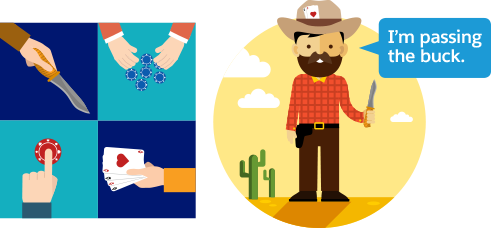Define Accountability
Learning Objectives
After completing this unit, you’ll be able to:
- Understand what accountability is.
- Determine which challenges you face in holding others accountable.
Defining Accountability
Burgers and fries, soap and water, accountability and delegation… just a few of life’s most harmonious pairs. Well, you might not have heard of the last one quite yet, but after finishing this module, you’ll be convinced of its greatness, too.
Accountability and delegation work with each other in complete harmony: You can’t have accountability without delegation or delegation without accountability. So let’s look at this duo’s individual parts to help your team achieve its highest level of performance yet.
Sammy tells his manager Tara that he’ll email her the data for tomorrow’s meeting when he gets home. After a frustrating commute and scarfing down dinner, he unexpectedly falls asleep without sending over the numbers. Her inbox empty and justifiably stressed, Tara spends all night doing the work that Sammy had already done to prepare for the meeting. The next morning, Sammy realizes his grievous error and avoids speaking to Tara in hopes that she’ll forget about his mistake.
Maybe you’ve been in Sammy’s shoes before? The day gets away from you and you miss a deadline. You hate that you’ve let someone else down. Actually, facing off with a bear seems more manageable than confronting your mistake. So what do you do? And if you’re Tara, how do you handle Sammy’s slip-up?

Accountability means taking ownership of your actions and responsibilities. It means that you have committed to deadlines and you’ll put your best effort into hitting that timeframe.
Establishing realistic timelines, communicating expectations, and measuring progress are three ways to establish accountability on your team. So let’s break it down so that you can face the challenge of accountability head-on.
The Challenge of Accountability

You’ve probably heard the phrase “passing the buck” or “the buck stops here.” The former addresses skirting responsibility, while the latter refers to owning up to it. Both terms originated during the American Frontier age when pioneers would use a buckhorn-handled knife, or “buck,” to show who deals during a poker game. You “pass the buck” after your turn whether or not you choose to take it.
In today’s complex, fast-paced work environment, accountability is a little more complicated than passing around a knife. You can’t brandish a knife to get things done (we hope not!) or force an objective to get approved that involves multiple stakeholders and contributors.
Accountability has to be a two-way street from executives to individual contributors. If you “drop the ball,” your reports and peers will hold you accountable. Even though conversations about accountability can be difficult, having them builds the trust you need to hit your metrics and reach your biggest stretch goals.
And if you’re thinking, “I don’t like hard conversations, can’t I just hope for the best?” Sadly, that doesn’t work either. Other team members don’t want to have to work doubly hard just to make up for an underperforming teammate. So when managers push these conversations aside, four out of five employees say their productivity, satisfaction, and work quality suffer. That’s a big deal. According to Psychology Today, 93% of those polled said they had co-workers who weren’t doing their share. Eek!
We know it’s not always easy, but one of the biggest responsibilities of being a manager is motivating and encouraging your team members to take ownership of projects and ideas without being overbearing. Helping them understand why their work matters and why they should take on a particular project is one of the most effective ways to do so say both Ansar Ahmed and Kris Muller.
Never fear, we have a “S.I.M.P.L.E.” way to establish accountability with your team.
Hold Others and (Yourself) Accountable
“Have you done your homework yet?” is a familiar way that we’ve been held accountable by our family, teachers, or peers. The underlying hope is that you respond with a resounding, “Already done!”
Now, substitute “report” or “presentation” for homework. As a manager you’re basically asking the same question, aiming for a tone of, “You’re on track, keep going!” rather than “Are you done yet?” Your teammates will appreciate your tone of encouragement and feel that their contribution is valued. How do you use this advice when you have to get things done on your plate? Click below to hear Ansar’s take on using concrete goals to holding yourself accountable.
If you’re worried about putting your newly acquired info into practice, never fear! Our next module is going to cover how easy accountability can be when you use our S.I.M.P.L.E framework.